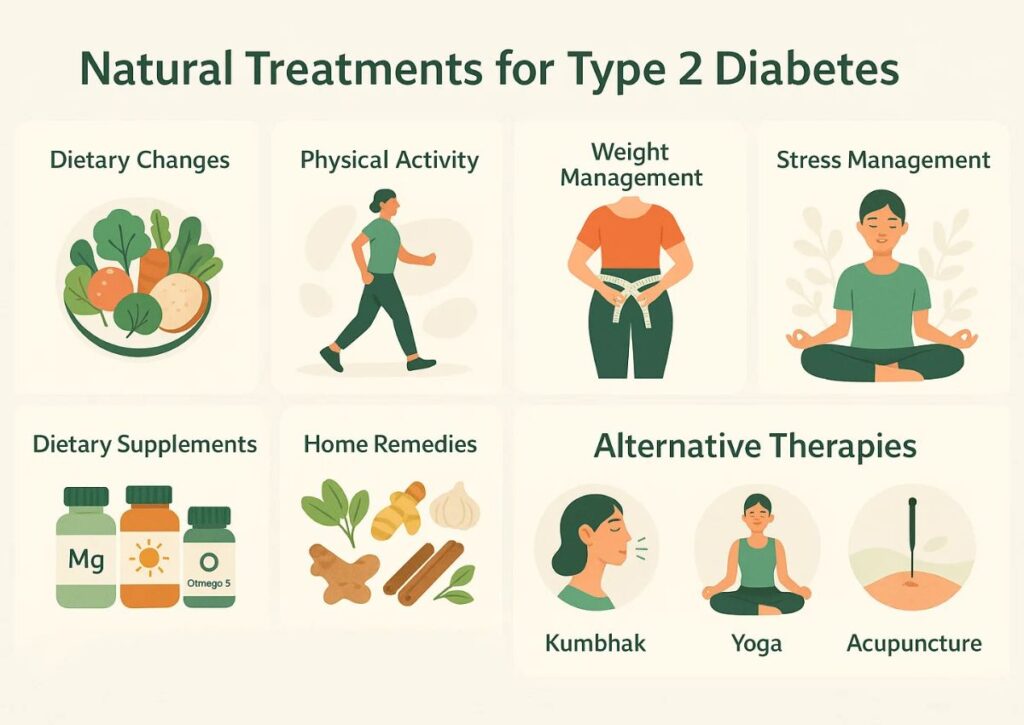
Type 2 Diabetes is a condition that is primarily managed with clinical treatments and medications. However natural treatments have been proven effective to treat and sometimes possibly reverse this life-debilitating condition. In this blog, we will discuss the lifestyle changes and natural treatments that have the potential to enrich your healing journey.
Here are some natural ways to treat Type 2 Diabetes that have worked positively for many people worldwide.
1. Dietary Changes
As the healing process first starts from within, most of our health issues can be resolved by consuming a balanced diet. Making mindful dietary choices can help regulate blood sugar levels, improve insulin sensitivity, and enhance overall health. Here are a few suggestions for a diabetes-friendly diet.
Here’s a closer look at how our food choices contribute towards better diabetes management.
Say Hello To Low Glycemic Index Foods
You might have frequently heard the term ‘Glycemic Index’ in the food ranking parlance. Ever wondered what it means? Glycemic index basically ranks how quickly a food source raises blood sugar levels.
If a food scores high, it means that it causes sudden sugar spikes and rapid rise in blood sugar levels within 2 hours of its consumption. Low GI foods release glucose gradually, thereby keeping your energy levels and post-meal sugar levels stable. Consume more low glycemic foods like
- Whole Grains – Barley, Steel-cut Oats, Quinoa, Whole Wheat Pasta, Brown Rice
- Vegetables – Leafy Greens, Cucumbers, Bell Peppers, Tomatoes, Broccoli, Raw Carrots, Sweet Potatoes
- Fruits – Berries, Cherries, Apples, Pears, Peaches, Plums, Oranges, Grapefruit
- Legumes – Lentils, Chickpeas, Kidney Beans, Black Beans, Peas
- Nuts – Almonds, Walnuts
- Seeds – Chia Seeds, Flax Seeds
- Dairy – Low-fat/Fat-free Milk, Unsweetened Greek Yoghurt, Cottage Cheese
- Beverages – Herbal Teas, Green Tea, Black Coffee
In addition to keeping your glucose levels stable, GI foods also reduce the risk of cardiovascular diseases.
Up Your Intake Of Soluble Fibers
Soluble fibers regulate blood sugar levels by slowing digestion and absorption. They improve gut health and blood glucose metabolism. It also helps your body to use insulin effectively, thereby improving insulin sensitivity. The best part is that soluble fiber aids in weight management and overall wellness. By helping lower LDL cholesterol, soluble fiber enriches heart health too.
Some of the sources of high-fiber foods are
- Fruits – Berries, Pears, Apples, Avocados, Bananas, Oranges
- Vegetables – Broccoli, Brussels sprouts, Carrots, Spinach, Sweet Potatoes, Artichokes
- Whole Grains – Oats, Barley, Quinoa, Brown Rice, Whole Wheat
- Seeds – Flax Seeds, Sunflower Seeds, Chia Seeds
- Nuts – Almonds, Pistachio,
- Legumes – Lentils, Chickpeas, Black Beans, Kidney Beans, Dry Peas, Edamame
- Beverages – Fruit Smoothies, Vegetable Soup/Juice
Aim for atleast 25-30 grams of fiber per day.
Nourish With Healthy Fats
Our mind has been tuned to shun ‘Fat’ when it comes to a healthy life. Contrary to this belief, healthy fats, especially monounsaturated and polyunsaturated fats, help improve insulin resistance and improve the body’s ability to use insulin more effectively.
Healthy fats can also help stabilise blood sugar levels by slowing down the digestion of carbohydrates. Healthy fats also enrich heart health, reduce inflammations, promote satiety, and help in effective weight management.
Some of the healthy fat sources are
- Olive Oil
- Avocados
- Nuts
- Fatty Fish
- Flax Seeds
- Chia Seeds
Prioritise Protein-Rich Foods
Protein plays an essential role in blood sugar management, as it supports blood sugar control, maintains muscle mass, and supports overall health. Including adequate protein in meals helps slow down the absorption of glucose, thereby avoiding sudden sugar spikes. It also helps in satiety and weight management.
Some of the popular food sources of protein are,
- Lean Meats
- Plant-based Proteins
- Dairy
- Eggs
- Legumes
- Pulses
Practical Tips For A Good Diet Routine
- Follow a balanced meal plan as a routine
- Take small servings of foods at regular intervals to maintain stable blood sugar levels.
- Snack on nuts or fruits to fill the gap between meals
- Stay hydrated for a good metabolism and digestive health
2. Physical Activity
Keeping yourself active is the key to help your muscles use glucose more efficiently. A dedicated exercise routine lowers insulin resistance and improves cardiovascular health. As everyone has different lifestyles and support systems in place, one size fits all doesn’t work when it comes to keeping oneself active. Please remember that consistency is the key!
There are various forms of exercises
Aerobic Exercises – Walking, Cycling, or Swimming for atleast 30 minutes a day
Strength Training – Lifting weights or using resistance bands help increase muscle mass and the body’s ability to use glucose.
Yoga – Rejuvenating your mind and enriching your overall health, a regular yoga routine improves circulation and boosts insulin sensitivity.
The Benefits of Exercise for Diabetes
- Improves insulin resistance
- Lowers blood sugar levels
- Keeps post-meal sudden sugar spikes in check
- Reduces visceral fat around the abdomen
- Enriches glucose metabolism
- Enhances insulin sensitivity
3. Weight Management
Maintaining a healthy weight can improve blood sugar control considerably. Losing just 5-10% of your body weight has a major impact and reduces insulin resistance significantly. Following a diet based weight management plan is beneficial, but remember to start any diet after consulting your healthcare provider.
This is because certain diets are detrimental to glucose metabolism. Moderation and consistency are the main attributes to a weight management plan. Here are few key things to remember
- Monitor your calorie intake as a balanced, calorie controlled diet helps shed weight and avoid blood sugar spikes
- Focus on nutrient rich meals rather than comfort foods like processed foods & sugary snacks.
- Aim for small portions – but increase the frequency. This will help your metabolic health and satiety.
- Keep your hydration levels up. You can go for water, green tea, or other unsweetened beverages.
The benefits of weight loss for managing Type 2 Diabetes are multifold. It can enhance insulin sensitivity and reduce the risk of diabetes related complications like heart disease, nerve damage, and kidney issues.
4. Manage Stress Effectively
Stress is something that drags us down, but pushes up our blood sugar levels! Yes, stress can have a direct impact on blood sugar control. Stress hormones like cortisol and adrenaline cause blood sugar spikes and impair body’s glucose metabolism. So it is imperative to control stress to manage Type 2 Diabetes.
Chronic stress can lead to insulin resistance and make it harder for your body to regulate blood sugar. Some stress management strategies that help keep stress in check are
- Meditation
- Journaling
- Mindfulness Therapy
- A dedicated hobby routine like painting or gardening
Above all this, good sleep reduces stress hormones and supports overall wellness – so aim for adequate sleep at night.
5. Take Dietary Supplements
As a balanced meal is not always a possibility in this fast-paced world, dietary supplements play a vital role in ensuring your body gets the right mix of vitamins, minerals, antioxidants, fiber, and other nutrients daily. Supplements are known to
- Improve insulin sensitivity
- Lower blood sugar levels
- Reduce oxidative stress
- Prevent diabetic neuropathy
Most supplements are available over the counter. But, it is important to consult your healthcare provider before adding supplements to your daily routine, as they can interact and impair the effect of diabetes medications.
6. Home Remedies
Housing an assortment of health enriching items, most kitchens are a health haven of sorts. We all love home remedies as the spices, condiments, vegetables, and fruits we generally use are straight from nature and enriched with medicinal and health-enriching properties. In addition to enhancing overall health, home remedies improve insulin sensitivity and glucose metabolism.
While most home remedies are proven effective to combat the ill-effects of Type 2 Diabetes to some extent, some might interfere with the results of your diabetes medications. So discuss with your healthcare provider before starting on home based remedies.
7. Alternative Therapies
Though conventional treatments are effective to keep Diabetes in check, alternative therapies are proven to be beneficial too. Alternative therapies like Kumbhak, Acupuncture, Yoga, Chiropractic care etc are effective to combat the health issues related to Type 2 Diabetes.
Generally speaking, each alternative therapy addresses specific health issues related to Type 2 Diabetes.
- Some therapies help in reducing stress levels.
- Some therapies help combat diabetic complications/nerve damage.
- Therapies like Kumbhak can transform your metabolism and even reverse Type 2 Diabetes.
To conclude, there is no one-size-fits-all approach to managing Type 2 Diabetes. Integrating these natural treatments with conventional treatments/medications can make diabetic management more effective. This holistic approach keeps your blood sugar levels in check and helps you lead a fulfilling, healthy life!
